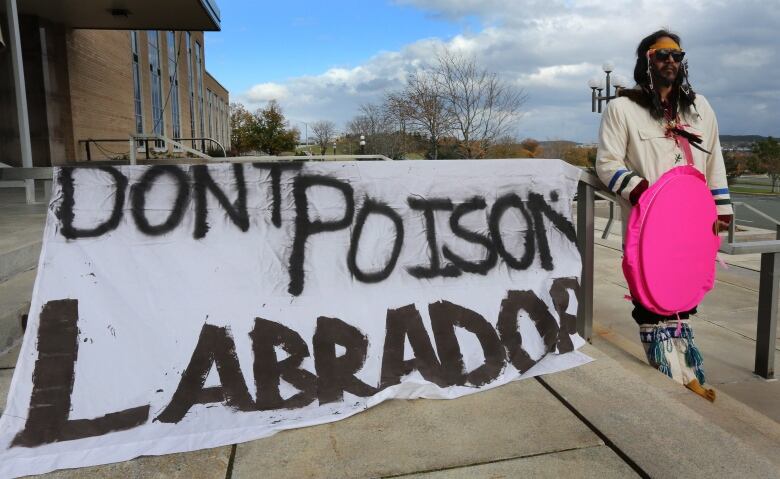Muskrat Falls protesters set example for successful demonstrations, policy expert says
Focusing on methylmercury was the key, Queens professor says

The protesters at Muskrat Falls set an example for other groups opposingmegaprojects across the country, says an academic at Queen's University.
-
Muskrat Falls project 'won't proceed' if it affects human health: environment minister
-
Protesters occupying Muskrat Falls camp exit, despite some skepticism
Warren Mabee, who has written extensively about Canadian energy projects of all types, is director of the Queen's Institute of Energy and Environmental Policy in Kingston, Ont.
Mabee spoke with Bernice Hillier of the Corner Brook Morning Show.
Q. How surprised were you that the government of Newfoundland and Labrador agreed to make changes to Muskrat Falls, in response to the protesters' actions?
I was happy to see that the government was willing to listen to the concerns, I think it was the right thing to do in this situation to step back and say, 'Okay, wait, we can adjust our timeline, we can slow things down, we can look at more testing and, very likely, more work before this project moves ahead.'
I think that that's a very good thing in today's world, where obtaining social license, the buy-in of the people who live around these projects and have to live with the results, has become so important.

Q. Why do you think the protests were so effective?
They [protesters]focused on a single thing, which is measurable and understandableand people can kind of wrap their heads around it, and that is methylmercury seepage and poisoning.
The bioaccumulation of mercury in fish and the potential of poisoning people as they ingest the fish downstream I think that's something that we understand. We've had lots of experience with mercury poisoning in different parts of the country.We've seen what the impacts are, so the general public can get their heads around it.
Scientists can go in and measure, and, basically [governments]can be found at fault if they're not doing things right.
Scientists have come out and spoken in support of the Inuit in this particular case. Having these types of issues makes it easy to apply pressure back to the proponent, whether they be government or industry, so that was a very effective strategy.

Q.What message do you think this successful protest sends to other governments?
It's better to listen and collaborate with the people who are going to live with these projects, whether they're Inuit, or First Nations, or just your average public member. It's important to respond when these issues arise, rather than just listening and saying, 'Well, we've thought of that, we're just going to keep going.'
It's important to ... actually change projects and to show that you're learning something from the discussion. That's something governments can pick up right across the countryas we look at all of these megaprojects.From further oilsands development, to pipelines, to liquified natural gas.
Q. Have other protests in Canada not been as successful because of muddying the waters,rather than concentrating on a single issue?
I think if you look at some of the discussion we've had over the pipelines, part of the reason they've been so murky and part of the reason some of those projects are still in play is that there are so many issues that people are concerned about.
It's a little bit difficult for people who are removed from the project to wrap their heads around it.

Q. How do you think this will impact future megaprojects? Do you think other governments will learn from this and choose to go about things differently?
I think the important thing for future megaprojects is that you enter into real partnerships with your local population.
When you can achieve buy-in, it stands a better chance to succeed. If you plan it from the topdown, when you have brief periods of consultation, followed by long periods of silence that was the old way of doing work and I don't think that's going to work in the future.
With files from Corner Brook Morning Show












_(720p).jpg)


 OFFICIAL HD MUSIC VIDEO.jpg)
.jpg)



























































































